KMI Pharma: Business Environment Analysis - Technology, CSR & Ethics
VerifiedAdded on 2023/06/17
|9
|2796
|397
Report
AI Summary
This report provides an analysis of the business environment surrounding KMI Pharmaceuticals, focusing on the effects of technological change, the impact of business ethics and corporate social responsibility (CSR), and the factors influencing business decisions. It assesses how technological advancements can provide a competitive advantage, improve communication, and enhance employee productivity for KMI Pharmaceuticals. The report also examines the positive and negative impacts of business ethics and CSR on modern business organizations, emphasizing their role in building trust and enhancing brand value while also acknowledging potential limitations and costs. Finally, it explores various factors influencing decision-making within KMI Pharmaceuticals, such as cognitive constraints, return on investment, prejudice, external environment, and data availability, highlighting their potential impacts on the company's success and brand image. This document is available on Desklib, a platform offering a wide range of study resources for students.
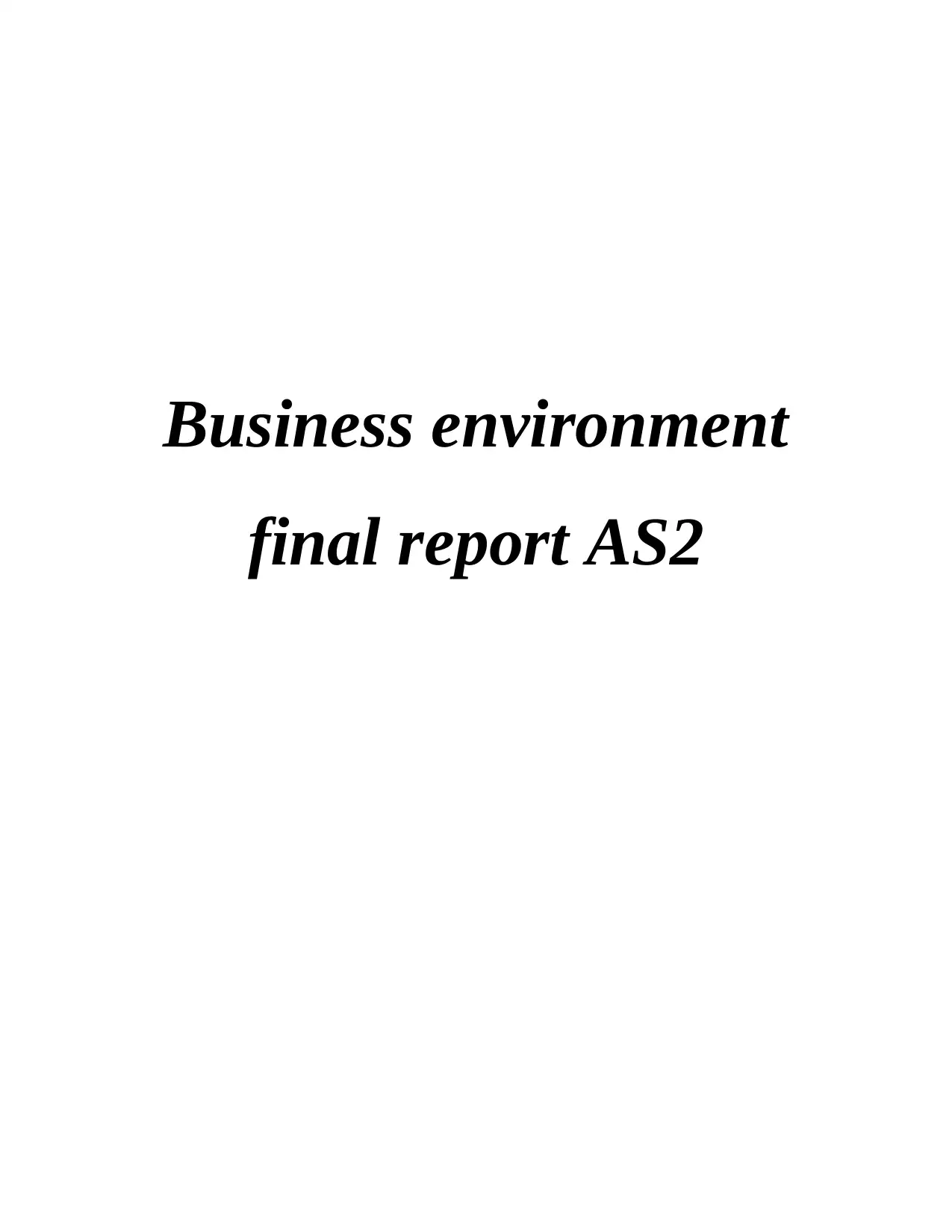
Business environment
final report AS2
final report AS2
Paraphrase This Document
Need a fresh take? Get an instant paraphrase of this document with our AI Paraphraser
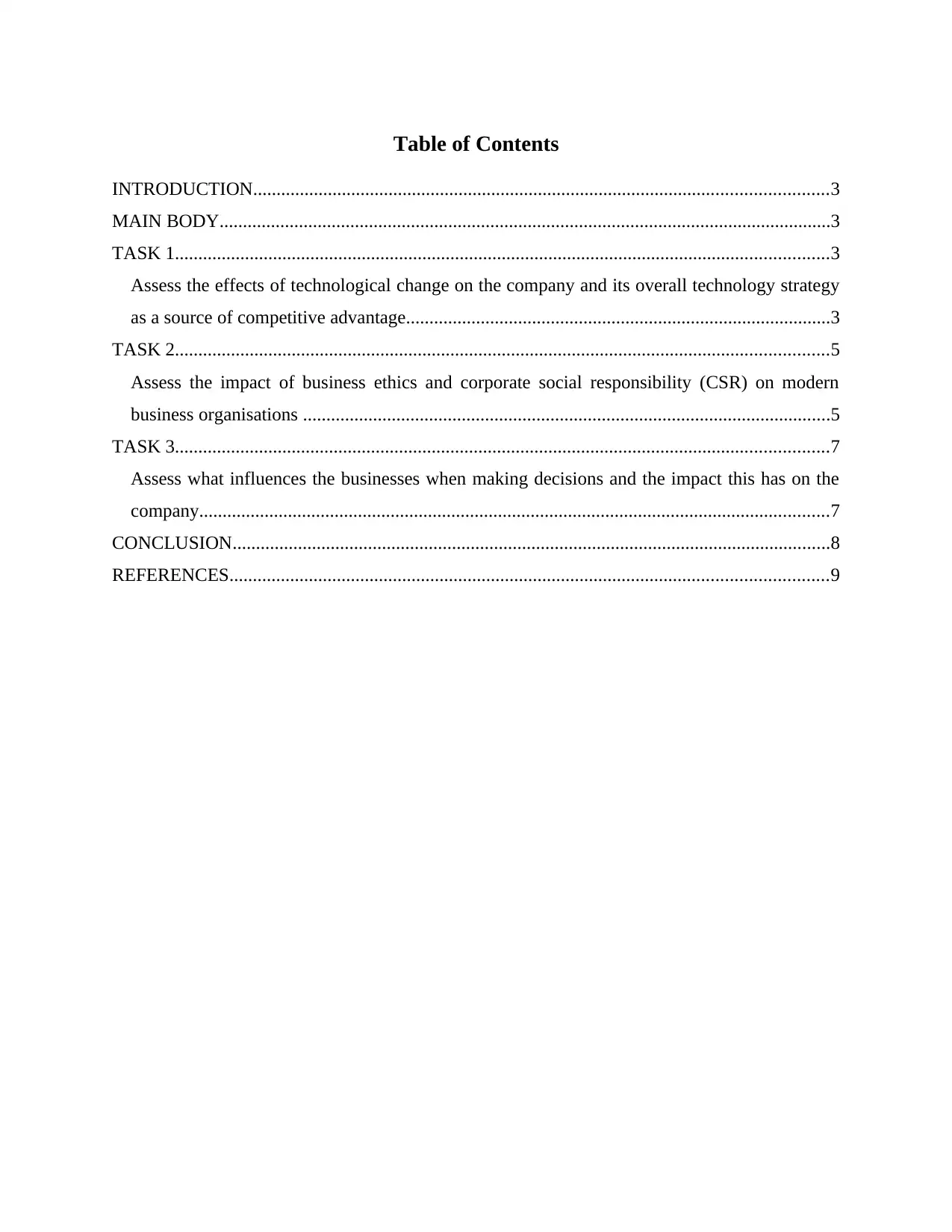
Table of Contents
INTRODUCTION...........................................................................................................................3
MAIN BODY...................................................................................................................................3
TASK 1............................................................................................................................................3
Assess the effects of technological change on the company and its overall technology strategy
as a source of competitive advantage...........................................................................................3
TASK 2............................................................................................................................................5
Assess the impact of business ethics and corporate social responsibility (CSR) on modern
business organisations .................................................................................................................5
TASK 3............................................................................................................................................7
Assess what influences the businesses when making decisions and the impact this has on the
company.......................................................................................................................................7
CONCLUSION................................................................................................................................8
REFERENCES................................................................................................................................9
INTRODUCTION...........................................................................................................................3
MAIN BODY...................................................................................................................................3
TASK 1............................................................................................................................................3
Assess the effects of technological change on the company and its overall technology strategy
as a source of competitive advantage...........................................................................................3
TASK 2............................................................................................................................................5
Assess the impact of business ethics and corporate social responsibility (CSR) on modern
business organisations .................................................................................................................5
TASK 3............................................................................................................................................7
Assess what influences the businesses when making decisions and the impact this has on the
company.......................................................................................................................................7
CONCLUSION................................................................................................................................8
REFERENCES................................................................................................................................9
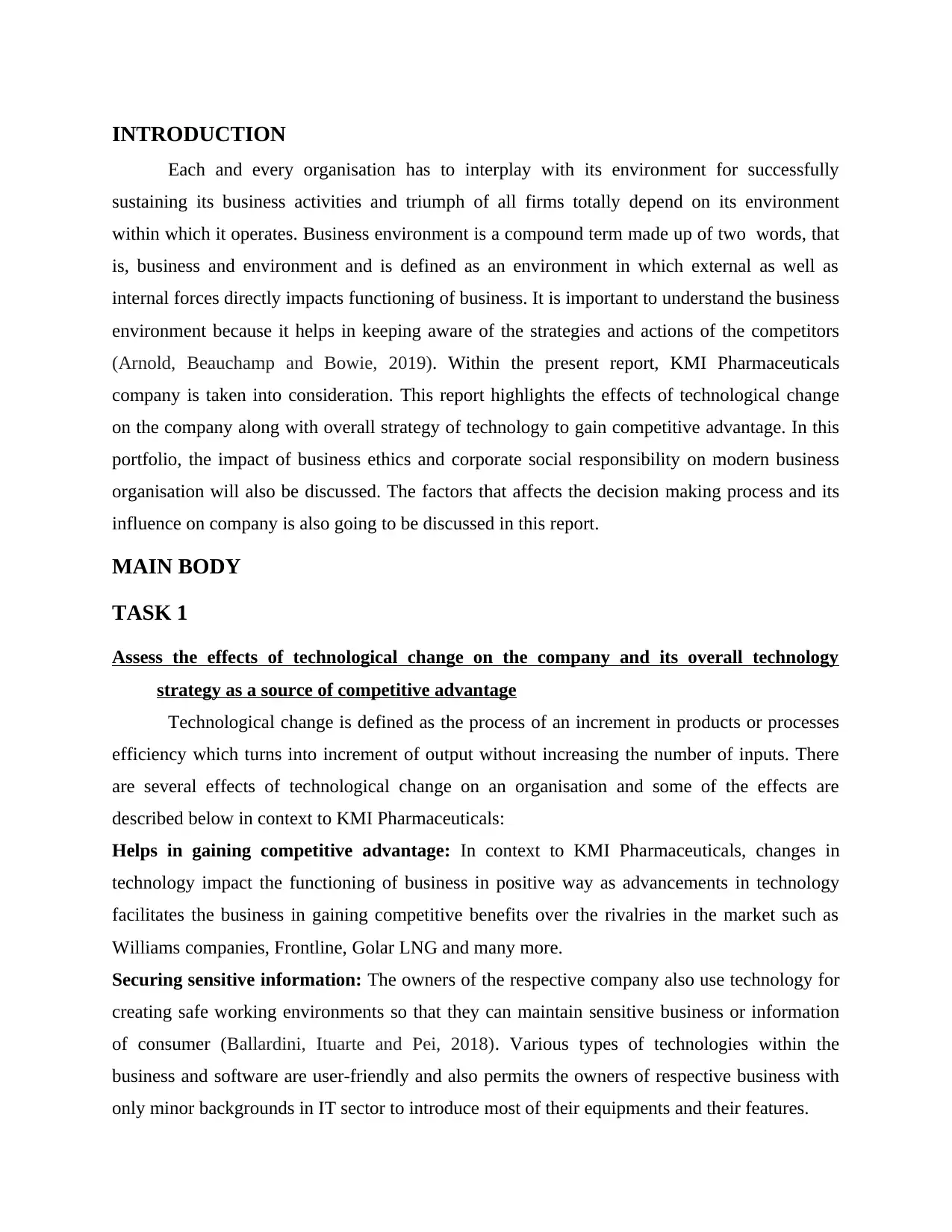
INTRODUCTION
Each and every organisation has to interplay with its environment for successfully
sustaining its business activities and triumph of all firms totally depend on its environment
within which it operates. Business environment is a compound term made up of two words, that
is, business and environment and is defined as an environment in which external as well as
internal forces directly impacts functioning of business. It is important to understand the business
environment because it helps in keeping aware of the strategies and actions of the competitors
(Arnold, Beauchamp and Bowie, 2019). Within the present report, KMI Pharmaceuticals
company is taken into consideration. This report highlights the effects of technological change
on the company along with overall strategy of technology to gain competitive advantage. In this
portfolio, the impact of business ethics and corporate social responsibility on modern business
organisation will also be discussed. The factors that affects the decision making process and its
influence on company is also going to be discussed in this report.
MAIN BODY
TASK 1
Assess the effects of technological change on the company and its overall technology
strategy as a source of competitive advantage
Technological change is defined as the process of an increment in products or processes
efficiency which turns into increment of output without increasing the number of inputs. There
are several effects of technological change on an organisation and some of the effects are
described below in context to KMI Pharmaceuticals:
Helps in gaining competitive advantage: In context to KMI Pharmaceuticals, changes in
technology impact the functioning of business in positive way as advancements in technology
facilitates the business in gaining competitive benefits over the rivalries in the market such as
Williams companies, Frontline, Golar LNG and many more.
Securing sensitive information: The owners of the respective company also use technology for
creating safe working environments so that they can maintain sensitive business or information
of consumer (Ballardini, Ituarte and Pei, 2018). Various types of technologies within the
business and software are user-friendly and also permits the owners of respective business with
only minor backgrounds in IT sector to introduce most of their equipments and their features.
Each and every organisation has to interplay with its environment for successfully
sustaining its business activities and triumph of all firms totally depend on its environment
within which it operates. Business environment is a compound term made up of two words, that
is, business and environment and is defined as an environment in which external as well as
internal forces directly impacts functioning of business. It is important to understand the business
environment because it helps in keeping aware of the strategies and actions of the competitors
(Arnold, Beauchamp and Bowie, 2019). Within the present report, KMI Pharmaceuticals
company is taken into consideration. This report highlights the effects of technological change
on the company along with overall strategy of technology to gain competitive advantage. In this
portfolio, the impact of business ethics and corporate social responsibility on modern business
organisation will also be discussed. The factors that affects the decision making process and its
influence on company is also going to be discussed in this report.
MAIN BODY
TASK 1
Assess the effects of technological change on the company and its overall technology
strategy as a source of competitive advantage
Technological change is defined as the process of an increment in products or processes
efficiency which turns into increment of output without increasing the number of inputs. There
are several effects of technological change on an organisation and some of the effects are
described below in context to KMI Pharmaceuticals:
Helps in gaining competitive advantage: In context to KMI Pharmaceuticals, changes in
technology impact the functioning of business in positive way as advancements in technology
facilitates the business in gaining competitive benefits over the rivalries in the market such as
Williams companies, Frontline, Golar LNG and many more.
Securing sensitive information: The owners of the respective company also use technology for
creating safe working environments so that they can maintain sensitive business or information
of consumer (Ballardini, Ituarte and Pei, 2018). Various types of technologies within the
business and software are user-friendly and also permits the owners of respective business with
only minor backgrounds in IT sector to introduce most of their equipments and their features.
⊘ This is a preview!⊘
Do you want full access?
Subscribe today to unlock all pages.

Trusted by 1+ million students worldwide
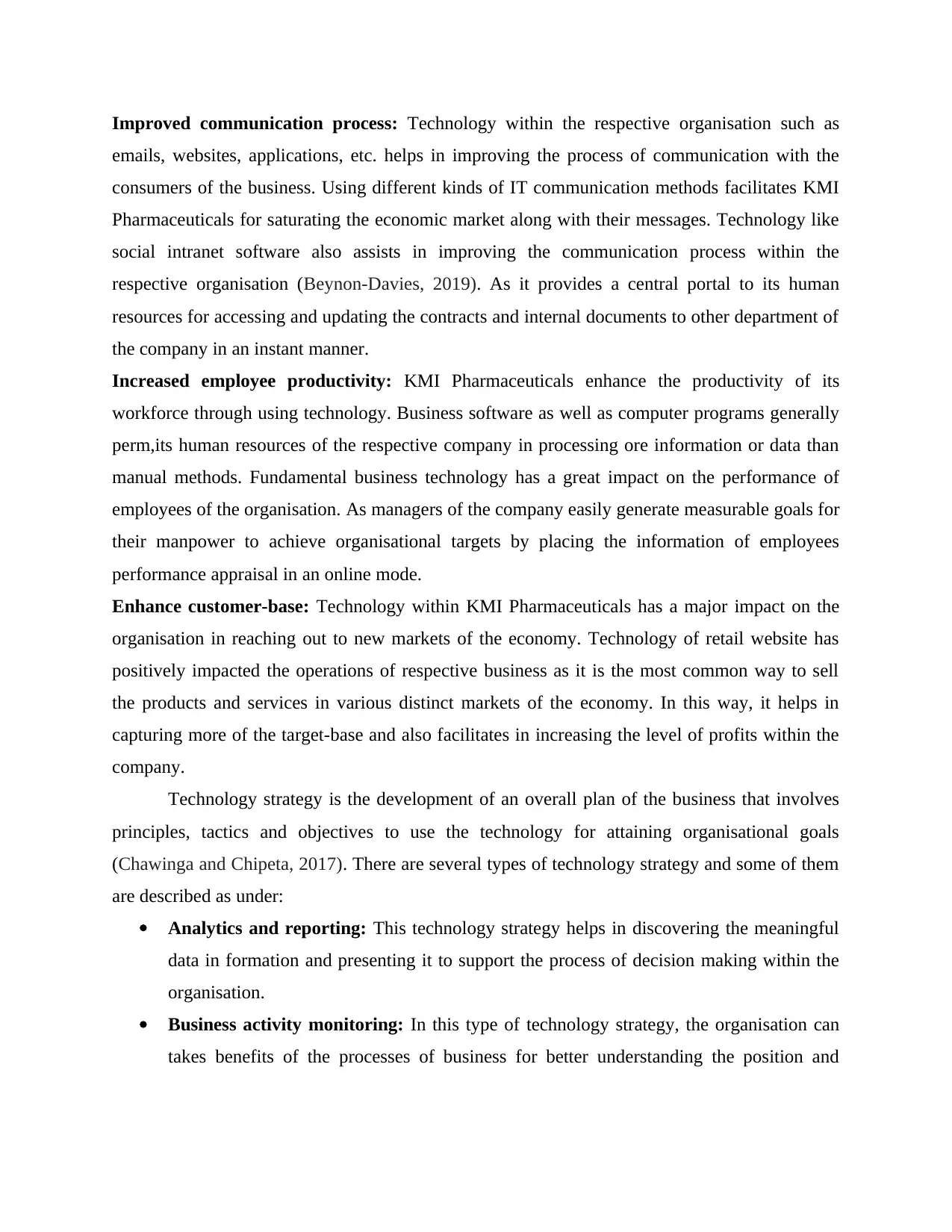
Improved communication process: Technology within the respective organisation such as
emails, websites, applications, etc. helps in improving the process of communication with the
consumers of the business. Using different kinds of IT communication methods facilitates KMI
Pharmaceuticals for saturating the economic market along with their messages. Technology like
social intranet software also assists in improving the communication process within the
respective organisation (Beynon-Davies, 2019). As it provides a central portal to its human
resources for accessing and updating the contracts and internal documents to other department of
the company in an instant manner.
Increased employee productivity: KMI Pharmaceuticals enhance the productivity of its
workforce through using technology. Business software as well as computer programs generally
perm,its human resources of the respective company in processing ore information or data than
manual methods. Fundamental business technology has a great impact on the performance of
employees of the organisation. As managers of the company easily generate measurable goals for
their manpower to achieve organisational targets by placing the information of employees
performance appraisal in an online mode.
Enhance customer-base: Technology within KMI Pharmaceuticals has a major impact on the
organisation in reaching out to new markets of the economy. Technology of retail website has
positively impacted the operations of respective business as it is the most common way to sell
the products and services in various distinct markets of the economy. In this way, it helps in
capturing more of the target-base and also facilitates in increasing the level of profits within the
company.
Technology strategy is the development of an overall plan of the business that involves
principles, tactics and objectives to use the technology for attaining organisational goals
(Chawinga and Chipeta, 2017). There are several types of technology strategy and some of them
are described as under:
Analytics and reporting: This technology strategy helps in discovering the meaningful
data in formation and presenting it to support the process of decision making within the
organisation.
Business activity monitoring: In this type of technology strategy, the organisation can
takes benefits of the processes of business for better understanding the position and
emails, websites, applications, etc. helps in improving the process of communication with the
consumers of the business. Using different kinds of IT communication methods facilitates KMI
Pharmaceuticals for saturating the economic market along with their messages. Technology like
social intranet software also assists in improving the communication process within the
respective organisation (Beynon-Davies, 2019). As it provides a central portal to its human
resources for accessing and updating the contracts and internal documents to other department of
the company in an instant manner.
Increased employee productivity: KMI Pharmaceuticals enhance the productivity of its
workforce through using technology. Business software as well as computer programs generally
perm,its human resources of the respective company in processing ore information or data than
manual methods. Fundamental business technology has a great impact on the performance of
employees of the organisation. As managers of the company easily generate measurable goals for
their manpower to achieve organisational targets by placing the information of employees
performance appraisal in an online mode.
Enhance customer-base: Technology within KMI Pharmaceuticals has a major impact on the
organisation in reaching out to new markets of the economy. Technology of retail website has
positively impacted the operations of respective business as it is the most common way to sell
the products and services in various distinct markets of the economy. In this way, it helps in
capturing more of the target-base and also facilitates in increasing the level of profits within the
company.
Technology strategy is the development of an overall plan of the business that involves
principles, tactics and objectives to use the technology for attaining organisational goals
(Chawinga and Chipeta, 2017). There are several types of technology strategy and some of them
are described as under:
Analytics and reporting: This technology strategy helps in discovering the meaningful
data in formation and presenting it to support the process of decision making within the
organisation.
Business activity monitoring: In this type of technology strategy, the organisation can
takes benefits of the processes of business for better understanding the position and
Paraphrase This Document
Need a fresh take? Get an instant paraphrase of this document with our AI Paraphraser
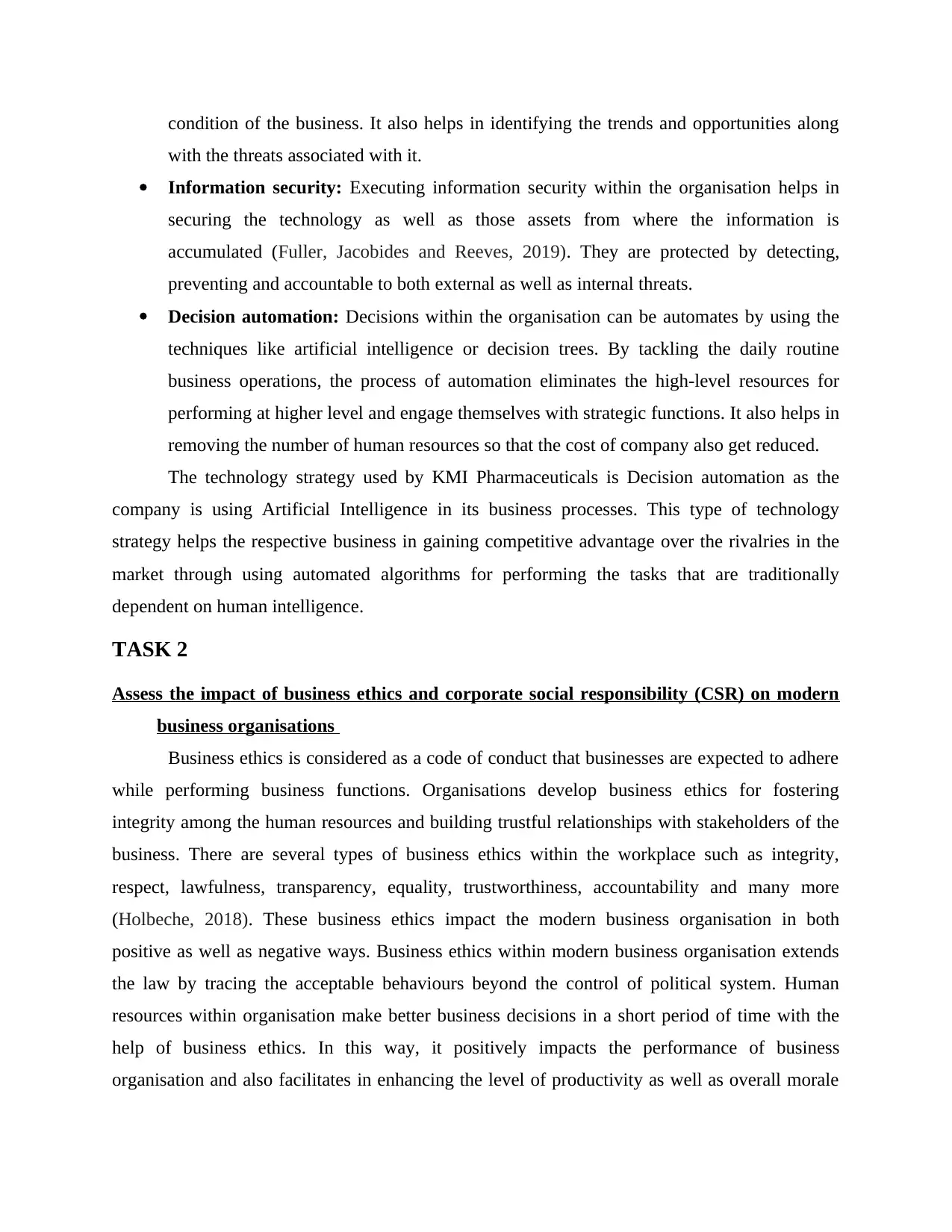
condition of the business. It also helps in identifying the trends and opportunities along
with the threats associated with it.
Information security: Executing information security within the organisation helps in
securing the technology as well as those assets from where the information is
accumulated (Fuller, Jacobides and Reeves, 2019). They are protected by detecting,
preventing and accountable to both external as well as internal threats.
Decision automation: Decisions within the organisation can be automates by using the
techniques like artificial intelligence or decision trees. By tackling the daily routine
business operations, the process of automation eliminates the high-level resources for
performing at higher level and engage themselves with strategic functions. It also helps in
removing the number of human resources so that the cost of company also get reduced.
The technology strategy used by KMI Pharmaceuticals is Decision automation as the
company is using Artificial Intelligence in its business processes. This type of technology
strategy helps the respective business in gaining competitive advantage over the rivalries in the
market through using automated algorithms for performing the tasks that are traditionally
dependent on human intelligence.
TASK 2
Assess the impact of business ethics and corporate social responsibility (CSR) on modern
business organisations
Business ethics is considered as a code of conduct that businesses are expected to adhere
while performing business functions. Organisations develop business ethics for fostering
integrity among the human resources and building trustful relationships with stakeholders of the
business. There are several types of business ethics within the workplace such as integrity,
respect, lawfulness, transparency, equality, trustworthiness, accountability and many more
(Holbeche, 2018). These business ethics impact the modern business organisation in both
positive as well as negative ways. Business ethics within modern business organisation extends
the law by tracing the acceptable behaviours beyond the control of political system. Human
resources within organisation make better business decisions in a short period of time with the
help of business ethics. In this way, it positively impacts the performance of business
organisation and also facilitates in enhancing the level of productivity as well as overall morale
with the threats associated with it.
Information security: Executing information security within the organisation helps in
securing the technology as well as those assets from where the information is
accumulated (Fuller, Jacobides and Reeves, 2019). They are protected by detecting,
preventing and accountable to both external as well as internal threats.
Decision automation: Decisions within the organisation can be automates by using the
techniques like artificial intelligence or decision trees. By tackling the daily routine
business operations, the process of automation eliminates the high-level resources for
performing at higher level and engage themselves with strategic functions. It also helps in
removing the number of human resources so that the cost of company also get reduced.
The technology strategy used by KMI Pharmaceuticals is Decision automation as the
company is using Artificial Intelligence in its business processes. This type of technology
strategy helps the respective business in gaining competitive advantage over the rivalries in the
market through using automated algorithms for performing the tasks that are traditionally
dependent on human intelligence.
TASK 2
Assess the impact of business ethics and corporate social responsibility (CSR) on modern
business organisations
Business ethics is considered as a code of conduct that businesses are expected to adhere
while performing business functions. Organisations develop business ethics for fostering
integrity among the human resources and building trustful relationships with stakeholders of the
business. There are several types of business ethics within the workplace such as integrity,
respect, lawfulness, transparency, equality, trustworthiness, accountability and many more
(Holbeche, 2018). These business ethics impact the modern business organisation in both
positive as well as negative ways. Business ethics within modern business organisation extends
the law by tracing the acceptable behaviours beyond the control of political system. Human
resources within organisation make better business decisions in a short period of time with the
help of business ethics. In this way, it positively impacts the performance of business
organisation and also facilitates in enhancing the level of productivity as well as overall morale
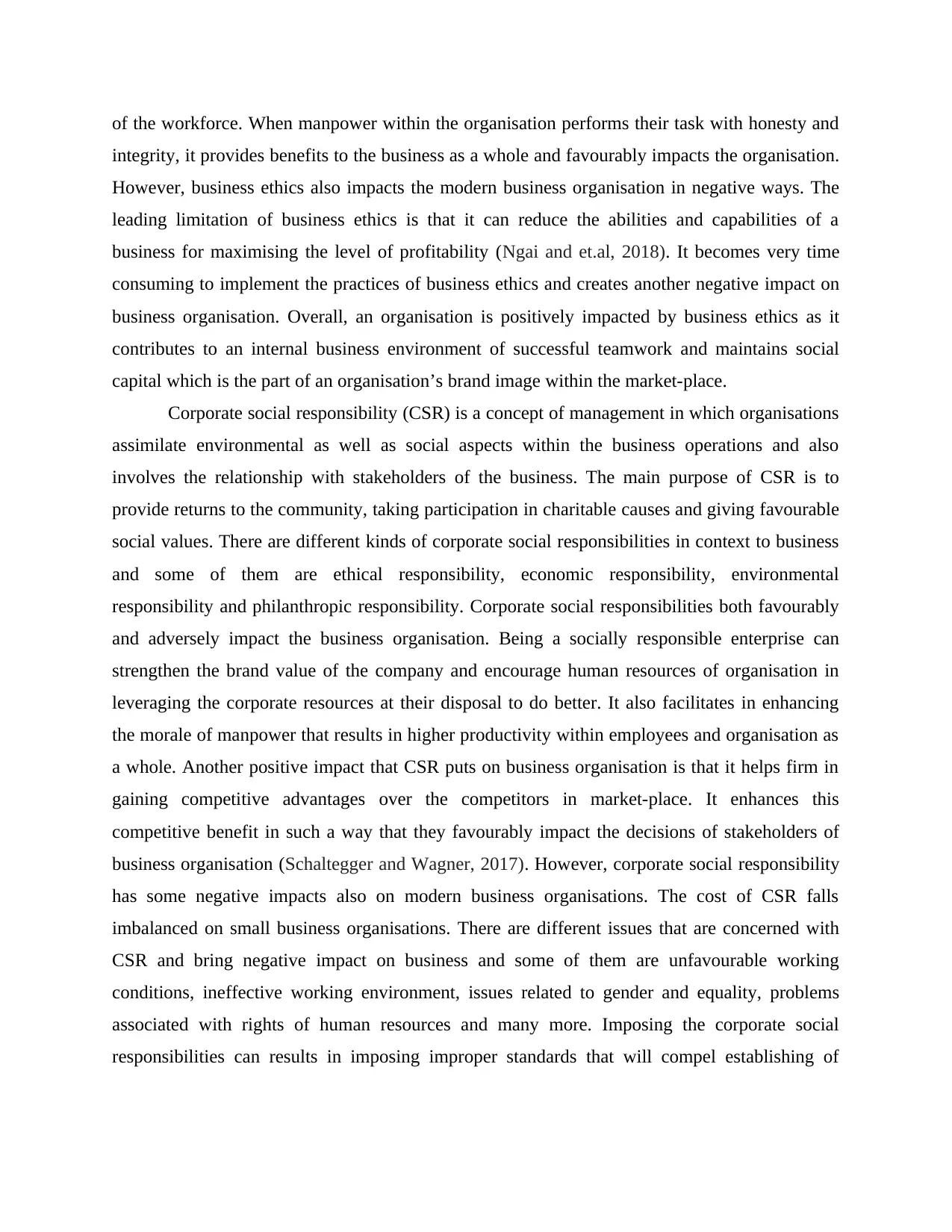
of the workforce. When manpower within the organisation performs their task with honesty and
integrity, it provides benefits to the business as a whole and favourably impacts the organisation.
However, business ethics also impacts the modern business organisation in negative ways. The
leading limitation of business ethics is that it can reduce the abilities and capabilities of a
business for maximising the level of profitability (Ngai and et.al, 2018). It becomes very time
consuming to implement the practices of business ethics and creates another negative impact on
business organisation. Overall, an organisation is positively impacted by business ethics as it
contributes to an internal business environment of successful teamwork and maintains social
capital which is the part of an organisation’s brand image within the market-place.
Corporate social responsibility (CSR) is a concept of management in which organisations
assimilate environmental as well as social aspects within the business operations and also
involves the relationship with stakeholders of the business. The main purpose of CSR is to
provide returns to the community, taking participation in charitable causes and giving favourable
social values. There are different kinds of corporate social responsibilities in context to business
and some of them are ethical responsibility, economic responsibility, environmental
responsibility and philanthropic responsibility. Corporate social responsibilities both favourably
and adversely impact the business organisation. Being a socially responsible enterprise can
strengthen the brand value of the company and encourage human resources of organisation in
leveraging the corporate resources at their disposal to do better. It also facilitates in enhancing
the morale of manpower that results in higher productivity within employees and organisation as
a whole. Another positive impact that CSR puts on business organisation is that it helps firm in
gaining competitive advantages over the competitors in market-place. It enhances this
competitive benefit in such a way that they favourably impact the decisions of stakeholders of
business organisation (Schaltegger and Wagner, 2017). However, corporate social responsibility
has some negative impacts also on modern business organisations. The cost of CSR falls
imbalanced on small business organisations. There are different issues that are concerned with
CSR and bring negative impact on business and some of them are unfavourable working
conditions, ineffective working environment, issues related to gender and equality, problems
associated with rights of human resources and many more. Imposing the corporate social
responsibilities can results in imposing improper standards that will compel establishing of
integrity, it provides benefits to the business as a whole and favourably impacts the organisation.
However, business ethics also impacts the modern business organisation in negative ways. The
leading limitation of business ethics is that it can reduce the abilities and capabilities of a
business for maximising the level of profitability (Ngai and et.al, 2018). It becomes very time
consuming to implement the practices of business ethics and creates another negative impact on
business organisation. Overall, an organisation is positively impacted by business ethics as it
contributes to an internal business environment of successful teamwork and maintains social
capital which is the part of an organisation’s brand image within the market-place.
Corporate social responsibility (CSR) is a concept of management in which organisations
assimilate environmental as well as social aspects within the business operations and also
involves the relationship with stakeholders of the business. The main purpose of CSR is to
provide returns to the community, taking participation in charitable causes and giving favourable
social values. There are different kinds of corporate social responsibilities in context to business
and some of them are ethical responsibility, economic responsibility, environmental
responsibility and philanthropic responsibility. Corporate social responsibilities both favourably
and adversely impact the business organisation. Being a socially responsible enterprise can
strengthen the brand value of the company and encourage human resources of organisation in
leveraging the corporate resources at their disposal to do better. It also facilitates in enhancing
the morale of manpower that results in higher productivity within employees and organisation as
a whole. Another positive impact that CSR puts on business organisation is that it helps firm in
gaining competitive advantages over the competitors in market-place. It enhances this
competitive benefit in such a way that they favourably impact the decisions of stakeholders of
business organisation (Schaltegger and Wagner, 2017). However, corporate social responsibility
has some negative impacts also on modern business organisations. The cost of CSR falls
imbalanced on small business organisations. There are different issues that are concerned with
CSR and bring negative impact on business and some of them are unfavourable working
conditions, ineffective working environment, issues related to gender and equality, problems
associated with rights of human resources and many more. Imposing the corporate social
responsibilities can results in imposing improper standards that will compel establishing of
⊘ This is a preview!⊘
Do you want full access?
Subscribe today to unlock all pages.

Trusted by 1+ million students worldwide
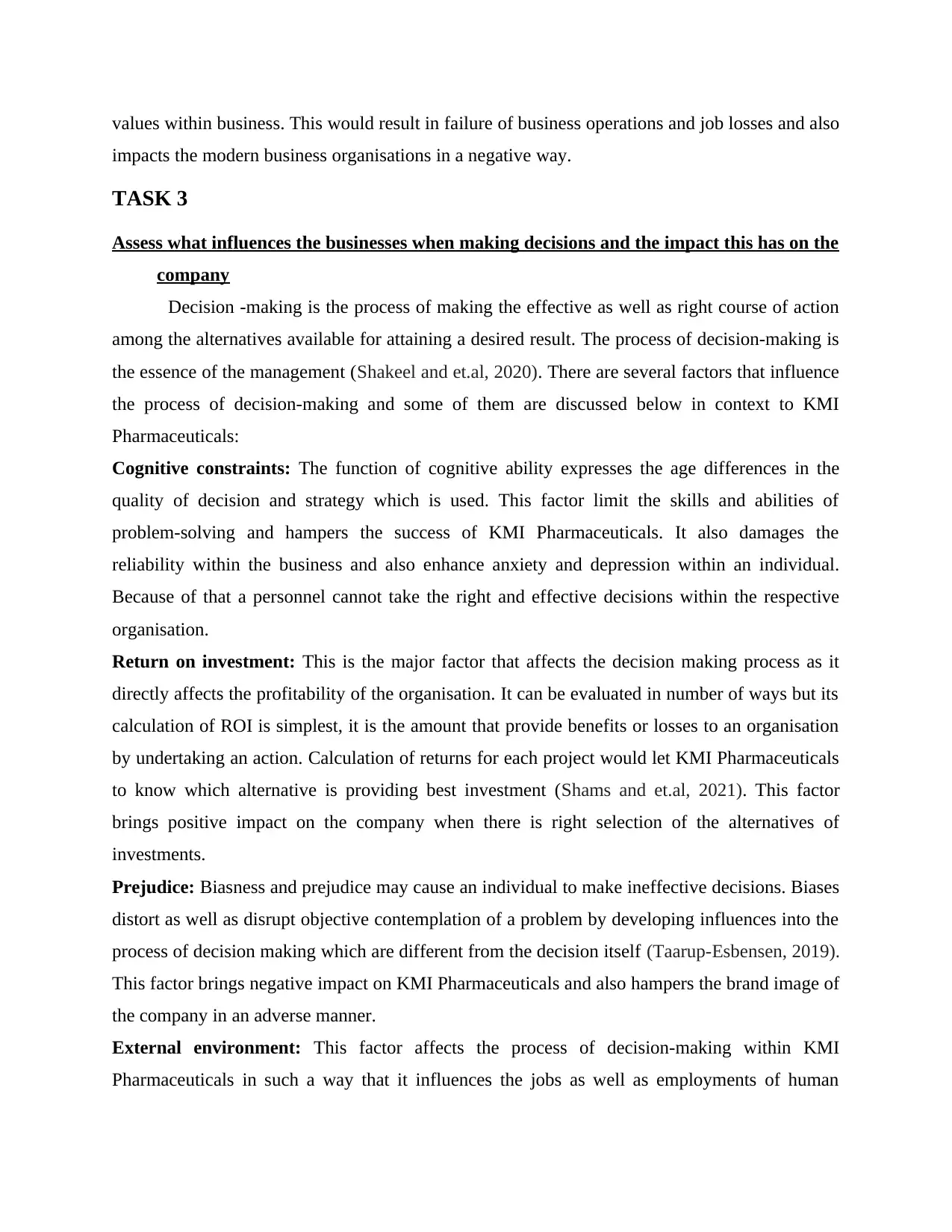
values within business. This would result in failure of business operations and job losses and also
impacts the modern business organisations in a negative way.
TASK 3
Assess what influences the businesses when making decisions and the impact this has on the
company
Decision -making is the process of making the effective as well as right course of action
among the alternatives available for attaining a desired result. The process of decision-making is
the essence of the management (Shakeel and et.al, 2020). There are several factors that influence
the process of decision-making and some of them are discussed below in context to KMI
Pharmaceuticals:
Cognitive constraints: The function of cognitive ability expresses the age differences in the
quality of decision and strategy which is used. This factor limit the skills and abilities of
problem-solving and hampers the success of KMI Pharmaceuticals. It also damages the
reliability within the business and also enhance anxiety and depression within an individual.
Because of that a personnel cannot take the right and effective decisions within the respective
organisation.
Return on investment: This is the major factor that affects the decision making process as it
directly affects the profitability of the organisation. It can be evaluated in number of ways but its
calculation of ROI is simplest, it is the amount that provide benefits or losses to an organisation
by undertaking an action. Calculation of returns for each project would let KMI Pharmaceuticals
to know which alternative is providing best investment (Shams and et.al, 2021). This factor
brings positive impact on the company when there is right selection of the alternatives of
investments.
Prejudice: Biasness and prejudice may cause an individual to make ineffective decisions. Biases
distort as well as disrupt objective contemplation of a problem by developing influences into the
process of decision making which are different from the decision itself (Taarup-Esbensen, 2019).
This factor brings negative impact on KMI Pharmaceuticals and also hampers the brand image of
the company in an adverse manner.
External environment: This factor affects the process of decision-making within KMI
Pharmaceuticals in such a way that it influences the jobs as well as employments of human
impacts the modern business organisations in a negative way.
TASK 3
Assess what influences the businesses when making decisions and the impact this has on the
company
Decision -making is the process of making the effective as well as right course of action
among the alternatives available for attaining a desired result. The process of decision-making is
the essence of the management (Shakeel and et.al, 2020). There are several factors that influence
the process of decision-making and some of them are discussed below in context to KMI
Pharmaceuticals:
Cognitive constraints: The function of cognitive ability expresses the age differences in the
quality of decision and strategy which is used. This factor limit the skills and abilities of
problem-solving and hampers the success of KMI Pharmaceuticals. It also damages the
reliability within the business and also enhance anxiety and depression within an individual.
Because of that a personnel cannot take the right and effective decisions within the respective
organisation.
Return on investment: This is the major factor that affects the decision making process as it
directly affects the profitability of the organisation. It can be evaluated in number of ways but its
calculation of ROI is simplest, it is the amount that provide benefits or losses to an organisation
by undertaking an action. Calculation of returns for each project would let KMI Pharmaceuticals
to know which alternative is providing best investment (Shams and et.al, 2021). This factor
brings positive impact on the company when there is right selection of the alternatives of
investments.
Prejudice: Biasness and prejudice may cause an individual to make ineffective decisions. Biases
distort as well as disrupt objective contemplation of a problem by developing influences into the
process of decision making which are different from the decision itself (Taarup-Esbensen, 2019).
This factor brings negative impact on KMI Pharmaceuticals and also hampers the brand image of
the company in an adverse manner.
External environment: This factor affects the process of decision-making within KMI
Pharmaceuticals in such a way that it influences the jobs as well as employments of human
Paraphrase This Document
Need a fresh take? Get an instant paraphrase of this document with our AI Paraphraser
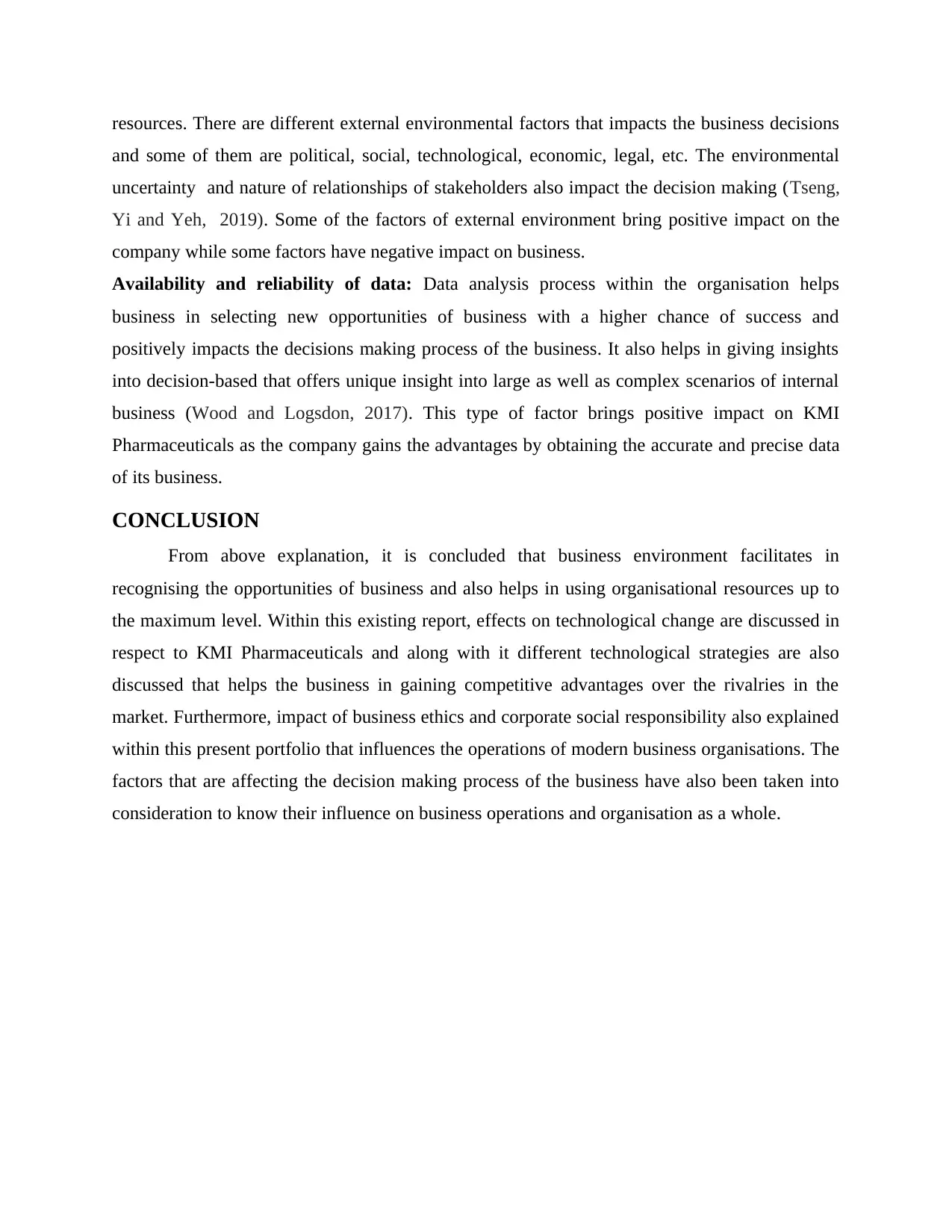
resources. There are different external environmental factors that impacts the business decisions
and some of them are political, social, technological, economic, legal, etc. The environmental
uncertainty and nature of relationships of stakeholders also impact the decision making (Tseng,
Yi and Yeh, 2019). Some of the factors of external environment bring positive impact on the
company while some factors have negative impact on business.
Availability and reliability of data: Data analysis process within the organisation helps
business in selecting new opportunities of business with a higher chance of success and
positively impacts the decisions making process of the business. It also helps in giving insights
into decision-based that offers unique insight into large as well as complex scenarios of internal
business (Wood and Logsdon, 2017). This type of factor brings positive impact on KMI
Pharmaceuticals as the company gains the advantages by obtaining the accurate and precise data
of its business.
CONCLUSION
From above explanation, it is concluded that business environment facilitates in
recognising the opportunities of business and also helps in using organisational resources up to
the maximum level. Within this existing report, effects on technological change are discussed in
respect to KMI Pharmaceuticals and along with it different technological strategies are also
discussed that helps the business in gaining competitive advantages over the rivalries in the
market. Furthermore, impact of business ethics and corporate social responsibility also explained
within this present portfolio that influences the operations of modern business organisations. The
factors that are affecting the decision making process of the business have also been taken into
consideration to know their influence on business operations and organisation as a whole.
and some of them are political, social, technological, economic, legal, etc. The environmental
uncertainty and nature of relationships of stakeholders also impact the decision making (Tseng,
Yi and Yeh, 2019). Some of the factors of external environment bring positive impact on the
company while some factors have negative impact on business.
Availability and reliability of data: Data analysis process within the organisation helps
business in selecting new opportunities of business with a higher chance of success and
positively impacts the decisions making process of the business. It also helps in giving insights
into decision-based that offers unique insight into large as well as complex scenarios of internal
business (Wood and Logsdon, 2017). This type of factor brings positive impact on KMI
Pharmaceuticals as the company gains the advantages by obtaining the accurate and precise data
of its business.
CONCLUSION
From above explanation, it is concluded that business environment facilitates in
recognising the opportunities of business and also helps in using organisational resources up to
the maximum level. Within this existing report, effects on technological change are discussed in
respect to KMI Pharmaceuticals and along with it different technological strategies are also
discussed that helps the business in gaining competitive advantages over the rivalries in the
market. Furthermore, impact of business ethics and corporate social responsibility also explained
within this present portfolio that influences the operations of modern business organisations. The
factors that are affecting the decision making process of the business have also been taken into
consideration to know their influence on business operations and organisation as a whole.
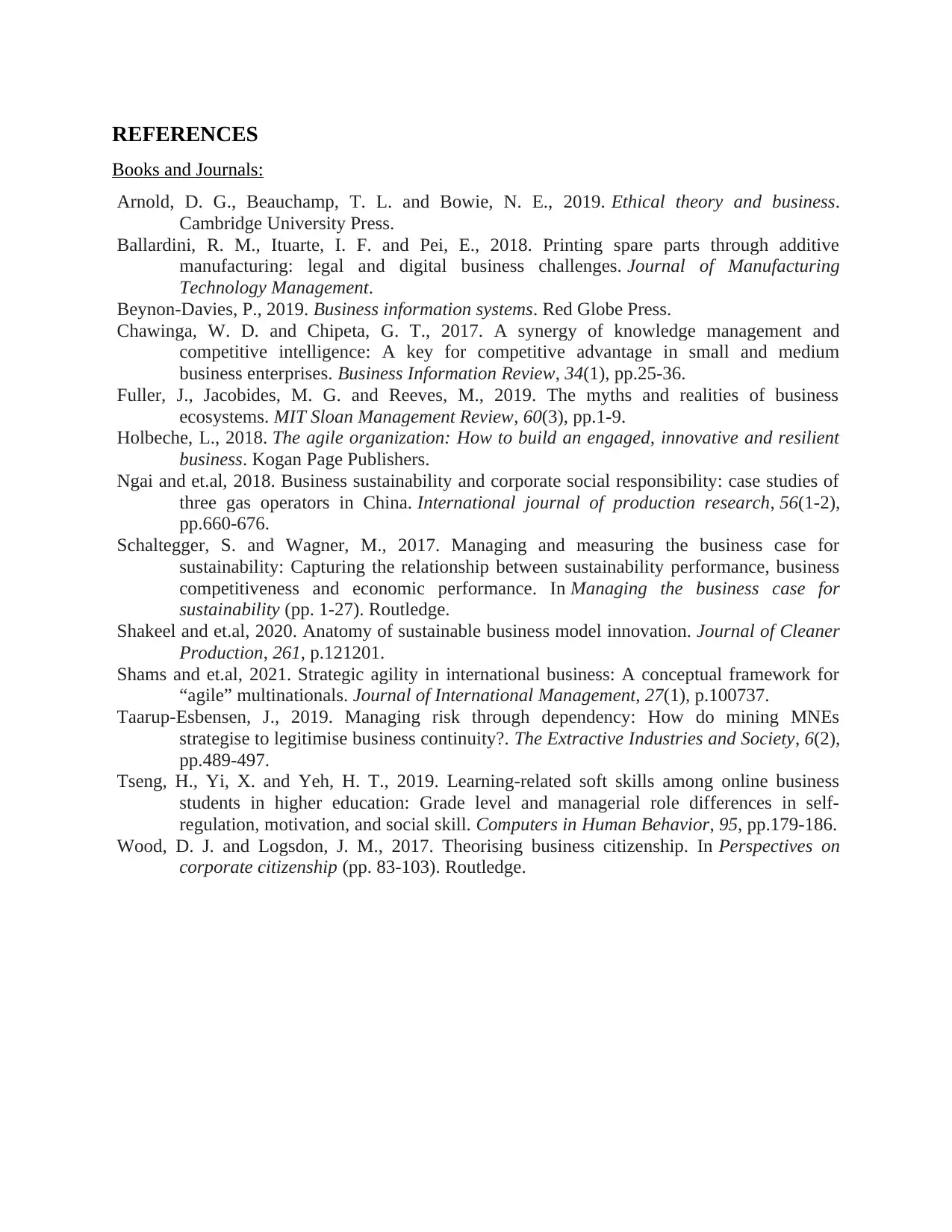
REFERENCES
Books and Journals:
Arnold, D. G., Beauchamp, T. L. and Bowie, N. E., 2019. Ethical theory and business.
Cambridge University Press.
Ballardini, R. M., Ituarte, I. F. and Pei, E., 2018. Printing spare parts through additive
manufacturing: legal and digital business challenges. Journal of Manufacturing
Technology Management.
Beynon-Davies, P., 2019. Business information systems. Red Globe Press.
Chawinga, W. D. and Chipeta, G. T., 2017. A synergy of knowledge management and
competitive intelligence: A key for competitive advantage in small and medium
business enterprises. Business Information Review, 34(1), pp.25-36.
Fuller, J., Jacobides, M. G. and Reeves, M., 2019. The myths and realities of business
ecosystems. MIT Sloan Management Review, 60(3), pp.1-9.
Holbeche, L., 2018. The agile organization: How to build an engaged, innovative and resilient
business. Kogan Page Publishers.
Ngai and et.al, 2018. Business sustainability and corporate social responsibility: case studies of
three gas operators in China. International journal of production research, 56(1-2),
pp.660-676.
Schaltegger, S. and Wagner, M., 2017. Managing and measuring the business case for
sustainability: Capturing the relationship between sustainability performance, business
competitiveness and economic performance. In Managing the business case for
sustainability (pp. 1-27). Routledge.
Shakeel and et.al, 2020. Anatomy of sustainable business model innovation. Journal of Cleaner
Production, 261, p.121201.
Shams and et.al, 2021. Strategic agility in international business: A conceptual framework for
“agile” multinationals. Journal of International Management, 27(1), p.100737.
Taarup-Esbensen, J., 2019. Managing risk through dependency: How do mining MNEs
strategise to legitimise business continuity?. The Extractive Industries and Society, 6(2),
pp.489-497.
Tseng, H., Yi, X. and Yeh, H. T., 2019. Learning-related soft skills among online business
students in higher education: Grade level and managerial role differences in self-
regulation, motivation, and social skill. Computers in Human Behavior, 95, pp.179-186.
Wood, D. J. and Logsdon, J. M., 2017. Theorising business citizenship. In Perspectives on
corporate citizenship (pp. 83-103). Routledge.
Books and Journals:
Arnold, D. G., Beauchamp, T. L. and Bowie, N. E., 2019. Ethical theory and business.
Cambridge University Press.
Ballardini, R. M., Ituarte, I. F. and Pei, E., 2018. Printing spare parts through additive
manufacturing: legal and digital business challenges. Journal of Manufacturing
Technology Management.
Beynon-Davies, P., 2019. Business information systems. Red Globe Press.
Chawinga, W. D. and Chipeta, G. T., 2017. A synergy of knowledge management and
competitive intelligence: A key for competitive advantage in small and medium
business enterprises. Business Information Review, 34(1), pp.25-36.
Fuller, J., Jacobides, M. G. and Reeves, M., 2019. The myths and realities of business
ecosystems. MIT Sloan Management Review, 60(3), pp.1-9.
Holbeche, L., 2018. The agile organization: How to build an engaged, innovative and resilient
business. Kogan Page Publishers.
Ngai and et.al, 2018. Business sustainability and corporate social responsibility: case studies of
three gas operators in China. International journal of production research, 56(1-2),
pp.660-676.
Schaltegger, S. and Wagner, M., 2017. Managing and measuring the business case for
sustainability: Capturing the relationship between sustainability performance, business
competitiveness and economic performance. In Managing the business case for
sustainability (pp. 1-27). Routledge.
Shakeel and et.al, 2020. Anatomy of sustainable business model innovation. Journal of Cleaner
Production, 261, p.121201.
Shams and et.al, 2021. Strategic agility in international business: A conceptual framework for
“agile” multinationals. Journal of International Management, 27(1), p.100737.
Taarup-Esbensen, J., 2019. Managing risk through dependency: How do mining MNEs
strategise to legitimise business continuity?. The Extractive Industries and Society, 6(2),
pp.489-497.
Tseng, H., Yi, X. and Yeh, H. T., 2019. Learning-related soft skills among online business
students in higher education: Grade level and managerial role differences in self-
regulation, motivation, and social skill. Computers in Human Behavior, 95, pp.179-186.
Wood, D. J. and Logsdon, J. M., 2017. Theorising business citizenship. In Perspectives on
corporate citizenship (pp. 83-103). Routledge.
⊘ This is a preview!⊘
Do you want full access?
Subscribe today to unlock all pages.

Trusted by 1+ million students worldwide
1 out of 9
Related Documents
Your All-in-One AI-Powered Toolkit for Academic Success.
+13062052269
info@desklib.com
Available 24*7 on WhatsApp / Email
![[object Object]](/_next/static/media/star-bottom.7253800d.svg)
Unlock your academic potential
Copyright © 2020–2026 A2Z Services. All Rights Reserved. Developed and managed by ZUCOL.




